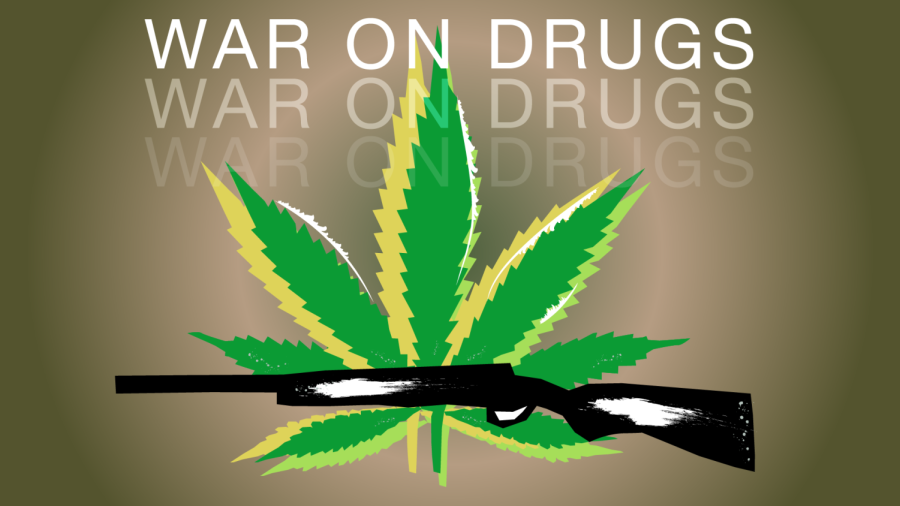OPINION: US government’s misguided War on Drugs
Should weed really be enemy in War on Drugs?
Under the Controlled Substance Act of 1970, marijuana is listed as a Schedule I controlled substance, meaning it poses very high risk for addiction and has few medical benefits.
April 14, 2022
On April 1, the U.S. House of Representatives passed the Marijuana Opportunity Reinvestment and Expungement Act of 2020, which aims to remove cannabis from the list of scheduled substances and eliminate criminal charges associated with it.
The MORE Act, however, is not expected to pass the U.S. Senate due to its own comprehensive bill on cannabis reform called Cannabis Administration and Opportunity Act. The bill seeks to impose a 25% excise tax on cannabis products, which many experts claim is too high, resulting in a new round of failed reform initiatives.
As of the writing of this column, 18 states as well as Washington, D.C. and Guam have legalized recreational weed, and 39 states and Washington, D.C. have legalized medical marijuana.
Washington state is among those states that have legalized both in its state legislature. Contrary to popular belief, the state did not go up in flames or turn into Woodstock. We are still alive and well.
While the majority of states have legalized cannabis, it is still federally considered a Schedule I drug, meaning it has no accepted medical applications and a high risk of abuse, according to the Drug Enforcement Administration. It sits among lysergic acid diethylamide (commonly known as LSD), 3,4-methylenedioxymethamphetamine (commonly known as MDMA, ecstasy or molly) and heroin, under the Controlled Substance Act of 1970.
More than 50 years ago, President Richard Nixon signed the CSA and publicly announced the War on Drugs, declaring drug abuse “public enemy No. 1” and primarily focusing on deterring the production, distribution and consumption of cannabis. Ironically, though, the U.S. was in the throes of the Vietnam War at the time, so was cannabis really public enemy number one, Nixon? Or did you start the War on Drugs in order to ensnare people of color and the anti-war leftists?
As the War on Drugs raged on, weed became its poster child. As a result, politicians were afraid to address the issue of cannabis legalization because they might have appeared soft on crime and subsequently lose votes, said Roman Scovel, junior psychology and criminal justice double major.
The War on Drugs is just another attempt at prohibition, said Mary Stohr, professor in the Department of Criminal Justice and Criminology. And we know how prohibition ended – by criminalizing the honest and enriching the criminal.
How long are we going to play this game? Why does the U.S. government continue waging a war against weed? What is it going to take to federally legalize it?
Now, I am not saying that cannabis cannot be abused. It certainly can. But, I mean, you can also abuse the 12-pack of Bud Light at your local supermarket, the quadruple shot latte at your nearest Starbucks or the pack of Marlboros from the corner convenience store.
Of the four things mentioned above, only one has medical merit … and it is the only one that is federally illegal. There is a myriad of empirical research supporting the therapeutic use of cannabis. For example, the FDA approved cannabis for the treatment of two forms of epilepsy, Dravet syndrome and Lennox-Gastaut syndrome.
Furthermore, there is ongoing research regarding its possible treatment of diseases and ailments, including Alzheimer’s disease, Crohn’s disease, eating disorders, post-traumatic stress disorder and cachexia.
In fact, the “greatest amount of evidence for the therapeutic effect of cannabis relates to its ability to reduce chronic pain, nausea and vomiting due to chemotherapy and spasticity from MS,” said Dr. Marcel Bonn-Miller, substance abuse specialist at the University of Pennsylvania’s Perelman School of Medicine.
However, cannabis research is being hampered because the DEA still considers it a Schedule I drug, which requires researchers to have special licensing.
Follow the science. We are way beyond the Reefer Madness propaganda.










